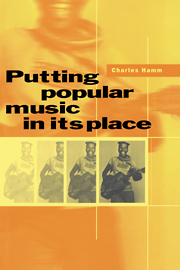Book contents
- Frontmatter
- Contents
- Acknowledgements
- Preface
- 1 Modernist narratives and popular music
- 2 Rock and the facts of life
- 3 Changing patterns in society and music: the US since World War II
- 4 “If I Were a Voice”: or, The Hutchinson Family and popular song as political and social protest
- 5 Some thoughts on the measurement of popularity in music
- 6 Elvis, a review
- 7 Home cooking and American soul in black South African popular music
- 8 Rock ‘n’ roll in a very strange society
- 9 African-American music, South Africa, and apartheid
- 10 “The constant companion of man”: Separate Development, Radio Bantu, and music
- 11 Privileging the moment of reception: music and radio in South Africa
- 12 Music and radio in the People's Republic of China
- 13 Towards a new reading of Gershwin
- 14 A blues for the ages
- 15 Graceland revisited
- 16 Dvořák in America: nationalism, racism, and national race
- 17 The last minstrel show?
- 18 The Role of Rock, a review
- 19 Genre, performance, and ideology in the early songs of Irving Berlin
- 20 Epilogue: John Cage revisited
- Index
18 - The Role of Rock, a review
Published online by Cambridge University Press: 05 February 2012
- Frontmatter
- Contents
- Acknowledgements
- Preface
- 1 Modernist narratives and popular music
- 2 Rock and the facts of life
- 3 Changing patterns in society and music: the US since World War II
- 4 “If I Were a Voice”: or, The Hutchinson Family and popular song as political and social protest
- 5 Some thoughts on the measurement of popularity in music
- 6 Elvis, a review
- 7 Home cooking and American soul in black South African popular music
- 8 Rock ‘n’ roll in a very strange society
- 9 African-American music, South Africa, and apartheid
- 10 “The constant companion of man”: Separate Development, Radio Bantu, and music
- 11 Privileging the moment of reception: music and radio in South Africa
- 12 Music and radio in the People's Republic of China
- 13 Towards a new reading of Gershwin
- 14 A blues for the ages
- 15 Graceland revisited
- 16 Dvořák in America: nationalism, racism, and national race
- 17 The last minstrel show?
- 18 The Role of Rock, a review
- 19 Genre, performance, and ideology in the early songs of Irving Berlin
- 20 Epilogue: John Cage revisited
- Index
Summary
The writings of religious fundamentalists tend to privilege one belief system over all others and to establish a hierarchy of values based on assumptions that are neither stated nor questioned. When this literature addresses music, particularly popular music, its content tends to become indistinguishable from that of critical and historical writing grounded in the modernist narratives of musical autonomy and authenticity.
The author of this book is an ordained pastor in the Christian Assembly of God sect. Like all fundamentalists, whether Christian, Muslim, Jewish, Catholic, Marxist, Constitutional, or whatever, he believes that “truth” is to be found only in the literal reading of a certain text, in this instance the Bible. Unfortunately for John Muncy, the Bible has nothing to say about rock music, but this does not deter him. Pointing out that “Jesus was called, ‘The Rock,’ a long time before anybody even heard of rock and roll music! Rock music is just a counterfeit for the real Rock … Jesus Christ!” (p. 387), Muncy proceeds to “prove” that the Bible does in fact speak to the issue of rock music by asserting that: (1) through its lyrics and with the aid of subliminal messages, rock entices its fans to engage in rebellion, sex without morals, alcohol, drugs, false religions, violence, sexual perversions, suicide, and occult practices; (2) the Bible forbids each of these practices; (3) therefore, the Bible forbids rock music.
- Type
- Chapter
- Information
- Putting Popular Music in its Place , pp. 367 - 369Publisher: Cambridge University PressPrint publication year: 1995

